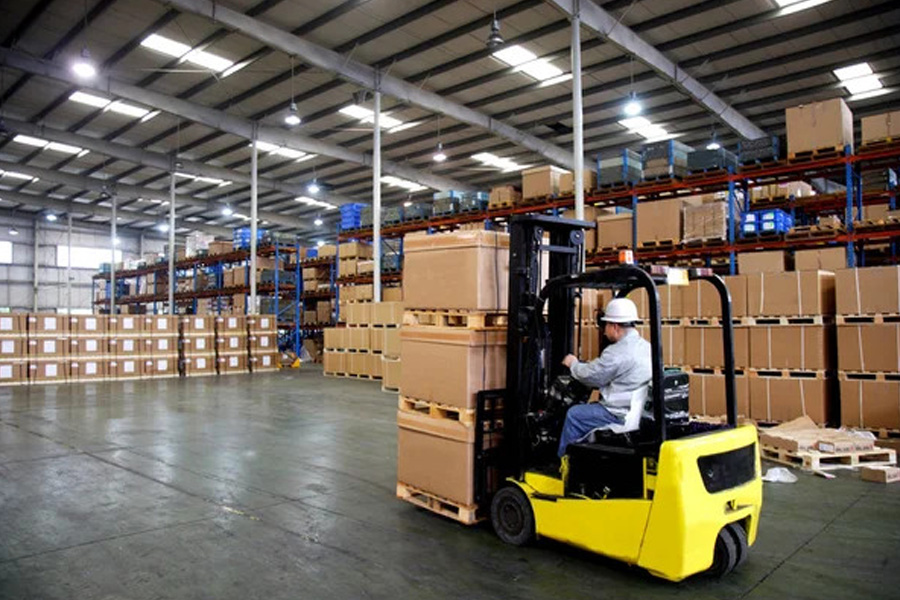Warehouse Services in India
In the vast landscape of India's logistics industry, warehouse services play a vital role in ensuring seamless flow of goods from manufacturers to customers. Let's explore the intricacies of warehouse services in India, their importance, types, emerging trends, challenges, benefits of outsourcing and insights into choosing the right service provider.
The logistics and supply chain sector in India is going through a phase of transformation, with warehouse services emerging as a linchpin in the overall process. As businesses expand and customer demands evolve, the need for efficient warehouses becomes more apparent.

The Importance of Efficient Warehousing in india
Efficient warehousing plays a vital role in India's dynamic business landscape, contributing significantly to the country's economic growth and competitiveness. With the wide spread of industries ranging from manufacturing to e-commerce, the importance of well-organized warehousing operations cannot be overstated. Firstly, efficient warehousing in India has a direct impact on supply chain effectiveness. Well-organized warehouses ensure timely and accurate order fulfillment, reduce lead times and increase customer satisfaction. This is especially important in the e-commerce sector, where fast delivery and seamless logistics contribute to the success of online businesses.
Secondly, efficient warehousing practices contribute to cost savings and resource optimization. By implementing advanced technologies such as warehouse management systems (WMS) and automation, Indian warehouses can reduce manual errors, increase inventory accuracy and reduce operational costs. This functionality is critical for businesses looking to navigate the complexities of a rapidly evolving marketplace, so they can meet customer demands, adapt to market changes, and remain globally competitive. In short, the importance of efficient warehousing in India goes beyond mere storage – it acts as a strategic enabler, driving economic growth and leading the nation towards a more flexible and agile future in the areas of logistics and supply chain management.
Types of Warehouse Services
Public Warehousing
Public warehouses offer shared storage space to multiple businesses, providing a cost-effective solution for companies with variable storage needs. This section explores the benefits and considerations of opting for public warehousing.
Private Warehousing
Private warehouses, as the name suggests, are owned and operated by a single company. Here, we discuss the advantages of private warehousing, such as enhanced control over inventory and tailored storage solutions.
Contract Warehousing
Contract warehousing involves outsourcing storage and distribution to a third-party provider. This segment outlines the flexibility and scalability contract warehousing offers to businesses.
Key Challenges in the Indian Warehouse Industry
Infrastructure Bottlenecks
Despite rapid strides, India faces infrastructure challenges that impact the warehousing sector. This part discusses the need for infrastructural development to unlock the full potential of warehouse services.
Skilled Labor Shortage
The shortage of skilled labor is a common issue in the warehouse industry. Explore how this challenge can be addressed through training and upskilling initiatives.
Regulatory Hurdles
Navigating regulatory frameworks can be complex. Learn about the regulatory challenges faced by warehouse service providers and the importance of compliance.
Advantages of Outsourcing Warehouse Services
Cost Efficiency
Outsourcing warehouse services can lead to significant cost savings. This section outlines the financial benefits businesses can reap by choosing the outsourcing route.
Focus on Core Competencies
By outsourcing warehousing, businesses can focus on their core competencies. Discover how this strategic move contributes to overall business growth.
Scalability
Scalability is crucial in a dynamic market. Explore how outsourcing warehouse services allows businesses to scale operations efficiently in response to market demands.
Contact for Warehouse Services in indiaWarehouse Services Faq's
Q: What are warehouse services?
A: Warehouse services involve storing, managing, and distributing goods from manufacturers to customers.
Q: Why is efficient warehousing important in India?
A: Efficient warehousing ensures timely order fulfillment, reduces lead times, and enhances customer satisfaction, contributing to economic growth.
Q: What types of warehouse services are available in India?
A: Types include public warehousing, private warehousing, and contract warehousing, each offering different benefits.
Q: What are public warehouses?
A: Public warehouses offer shared storage space to multiple businesses, providing a cost-effective solution for variable storage needs.
Q: What are private warehouses?
A: Private warehouses are owned and operated by a single company, offering enhanced control over inventory and tailored storage solutions.
Q: What is contract warehousing?
A: Contract warehousing involves outsourcing storage and distribution to a third-party provider, offering flexibility and scalability.
Q: What are the benefits of outsourcing warehouse services?
A: Outsourcing can lead to cost savings, allows businesses to focus on core competencies, and provides scalability to meet market demands.
Q: What challenges does the Indian warehouse industry face?
A: Key challenges include infrastructure bottlenecks, skilled labor shortages, and navigating complex regulatory frameworks.
